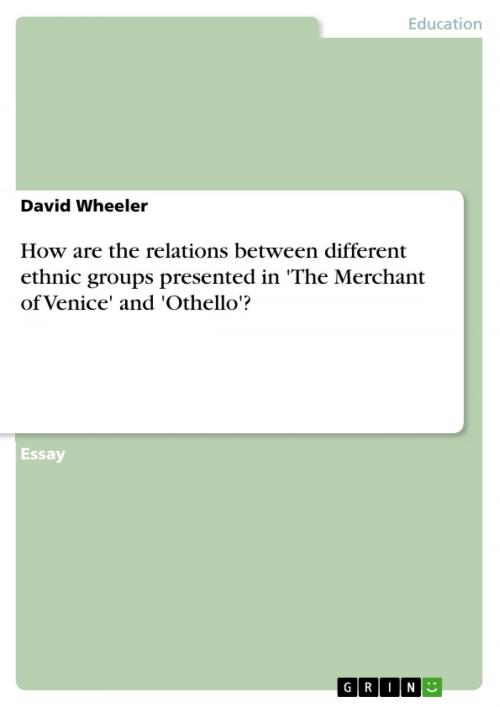How are the relations between different ethnic groups presented in 'The Merchant of Venice' and 'Othello'?
Fiction & Literature, Literary Theory & Criticism, British| Author: | David Wheeler | ISBN: | 9783640959068 |
| Publisher: | GRIN Verlag | Publication: | July 14, 2011 |
| Imprint: | GRIN Verlag | Language: | English |
| Author: | David Wheeler |
| ISBN: | 9783640959068 |
| Publisher: | GRIN Verlag |
| Publication: | July 14, 2011 |
| Imprint: | GRIN Verlag |
| Language: | English |
Essay from the year 2011 in the subject English - Discussion and Essays, grade: 2.1, Churchill College, Cambridge (-), language: English, abstract: What Iago and Roderigo call 'unnatural' and unjust only reveals, ironically, how humanly unnatural and morally unjust they are. Racism is so reviled by Shakespeare that, in Iago, he presents one of the moist vividly ugly and alarming life-sized portraits of unequivocal racist hatred of black people in literature. It is true that Brabantio reacts with horror at the thought of Othello marrying his daughter: Iago is clever enough to tap into this primal and illogical fear of miscegenation, but Othello's first appearance and the way Shakespeare presents him as a well-spoken, articulate and persuasive human being demonstrates that Shakespeare does not endorse any stereotypical view of non-white people at all. In Act One, scene two Shakespeare portrays Othello as calm, measured and sensitive - hardly the 'black ram' that Iago has so crudely referred to. In fact, Shakespeare's presentation of Othello highlights the ironic untruthfulness of Iago's words. He is much more than the 'Barbary horse' that Iago calls him (Act one, scene one, 113). Shakespeare presents Iago as the character with the most psychological problems. This is not just a question of his racism - it is also his obsessive pursuit of Othello's downfall and his cynical, debased attitude to life. Iago's speech throughout the play is full of disgusting animal images - this shows us more about his conception of what it is to be human than it does about Othello and other non-Europeans. Samuel Taylor Coleridge (quoted in Kermode, page) wrote about Iago's 'motiveless malignity', but that is not strictly true: Iago does give two reasons for his hatred of the Moor - at the end of the opening scene of the play he expresses his anger at being passed over for promotion to lieutenant and at the end of Act One, scene three he says that he suspects that Othello has had sex with Emilia, Iago's wife: 'It is thought abroad that twixt my sheets? He has done my office.' (lines 369 - 370). Therefore, Iago does have clear motives. However, that does not explain the sheer joy and relish Iago feels at triumphing over Othello. But even this sadistic enjoyment of destroying other people's lives is not inherently racist: he destroys the lives of all the characters in the play - without a hint of remorse - white and black, Venetian and non-Venetian. Iago is a bully - and he bullies Othello because of his color, but he might just as easily have bullied him about his age.
Essay from the year 2011 in the subject English - Discussion and Essays, grade: 2.1, Churchill College, Cambridge (-), language: English, abstract: What Iago and Roderigo call 'unnatural' and unjust only reveals, ironically, how humanly unnatural and morally unjust they are. Racism is so reviled by Shakespeare that, in Iago, he presents one of the moist vividly ugly and alarming life-sized portraits of unequivocal racist hatred of black people in literature. It is true that Brabantio reacts with horror at the thought of Othello marrying his daughter: Iago is clever enough to tap into this primal and illogical fear of miscegenation, but Othello's first appearance and the way Shakespeare presents him as a well-spoken, articulate and persuasive human being demonstrates that Shakespeare does not endorse any stereotypical view of non-white people at all. In Act One, scene two Shakespeare portrays Othello as calm, measured and sensitive - hardly the 'black ram' that Iago has so crudely referred to. In fact, Shakespeare's presentation of Othello highlights the ironic untruthfulness of Iago's words. He is much more than the 'Barbary horse' that Iago calls him (Act one, scene one, 113). Shakespeare presents Iago as the character with the most psychological problems. This is not just a question of his racism - it is also his obsessive pursuit of Othello's downfall and his cynical, debased attitude to life. Iago's speech throughout the play is full of disgusting animal images - this shows us more about his conception of what it is to be human than it does about Othello and other non-Europeans. Samuel Taylor Coleridge (quoted in Kermode, page) wrote about Iago's 'motiveless malignity', but that is not strictly true: Iago does give two reasons for his hatred of the Moor - at the end of the opening scene of the play he expresses his anger at being passed over for promotion to lieutenant and at the end of Act One, scene three he says that he suspects that Othello has had sex with Emilia, Iago's wife: 'It is thought abroad that twixt my sheets? He has done my office.' (lines 369 - 370). Therefore, Iago does have clear motives. However, that does not explain the sheer joy and relish Iago feels at triumphing over Othello. But even this sadistic enjoyment of destroying other people's lives is not inherently racist: he destroys the lives of all the characters in the play - without a hint of remorse - white and black, Venetian and non-Venetian. Iago is a bully - and he bullies Othello because of his color, but he might just as easily have bullied him about his age.















